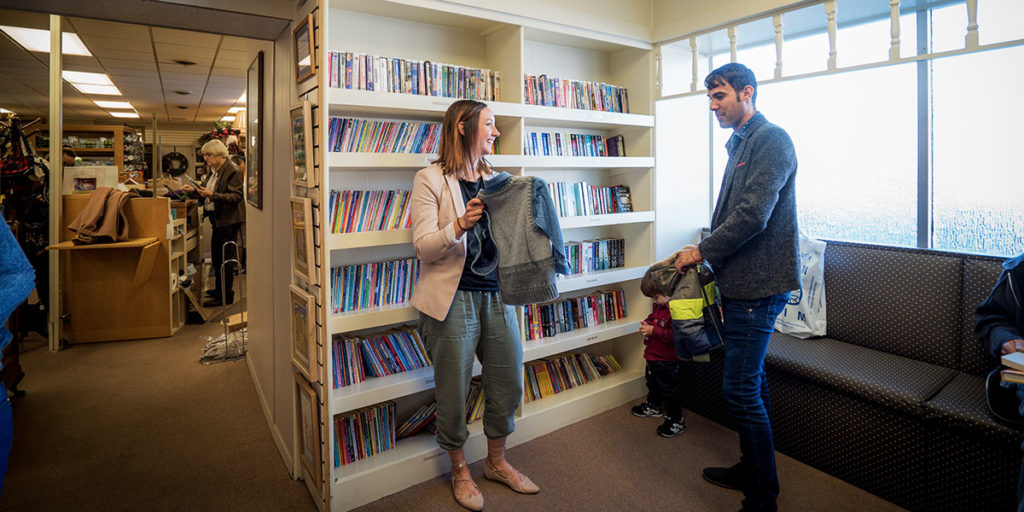
Ashley Carr is best known by over 2,000 refugees and immigrants in Lincoln as “Ashley Dina Har.”
In English, this translates to ‘very crazy Ashley.’
As a refugee resettlement case manager, Ashley’s days are a lot like her nickname – crazy. She drives her clients to doctor appointments and school, teaches them how to ride the bus, helps them apply for jobs or takes them shopping at a local thrift store.
Her job is to help shoulder the burden for people who are coming to the United States for the first time, she said, and it’s humbling work.
So many of her clients refer to her as ‘very crazy Ashley’ because she loves to make people laugh. Whether she’s cranking up country music as she drives around town or stumbling over phrases in another language, Ashely does it all with a smile that welcomes and invites people to settle in to Lincoln.
Her job is what she dreamed of doing, even though it’s so different than what she expected.
Ashley said it was during a study abroad trip to Italy that she really started to understand her love of different cultures. She was immediately fascinated by the Italian culture and wanted to immerse herself in the everyday life of the people – but there was a problem, she didn’t know the language. It was frustrating to want to enter into another culture, but not be able to because there were so many barriers. This experience is what sparked her interest in refugees and immigrants.
While she laughs now about that fact that her temporary discomfort during her study abroad trip opened her eyes to the experience of refugees and immigrants, it stirred up a passion for people that is so evident in her work.
Ashley started out as an intern at the Lincoln Literacy Council, where she eventually received a full-time job, before becoming a case manager with Catholic Social Services.
During her work, Ashley said her eyes have been opened to the heartbreaking stories of people escaping difficult situations with the hope of finding safety and a renewed sense of home. Many of them come to Lincoln with few possessions and little knowledge about American culture, other than what they’ve seen on TV or heard from family and friends.
During the refugee resettlement process, refugees take culture orientation classes in their homeland before they come to the United States. But Ashley said the reality of what they experience is so different than what they’ve learned during their classes. Things like running water, ovens, vacuum cleaners and how to take a shower are anomalies to many refugees, depending on their country of origin. There’s a huge learning curve, Ashley said, but she’s been so impressed with the resilience of her clients.
After two years as a refugee resettlement case manager, Ashley said it’s hard not to become numb to the traumatic stories that she hears. She said the initial intake meeting is often highly emotional. They tell her stories of what or who they’ve lost during their resettlement process and Ashley sits and listens.
She said it’s difficult not to dwell on these stories when she’s away from work, however, she also wants to remember the special moments of each case. One of those moments is when she meets a family at the airport for the first time.
Ashley is at the airport all the time, but these trips are special.
For many refugees, driving in a car is a big adjustment, so being in an airplane can be extremely overwhelming. She said they often get off the plane tired from days of travel, confused and nervous about their new home. They’re greeted by other family members or friends who have been in their shoes before… and then there’s Ashley, smiling and ready to hug them or shake their hand, welcoming them to their new home.
She said that no matter how many airport runs she’s done, she always tries to treat each airport reception like it’s the first one. She never wants to do it because it’s just part of her job, she wants to welcome people to Lincoln because she’s excited they’re here.
During one of her first meetings with a new client, Ashley said she likes to explain that she’s there to help them find resources and adjust to their new surroundings, but most importantly, she reassures them that they’re safe.
She looks them in the eyes, understanding as much as she can about their story, and says: “Your suffering is done.”
She explains that life won’t be easy, but they don’t have to live in fear anymore, and this is a welcomed and surprising sentiment for most refugees to hear.
“Their countries have disregarded them, so this is a big turning point,” Ashley said. “I feel grateful to be able to tell them that.”
For Ashley, her work has become more than clocking in and out of the office everyday.
Her clients have become her friends. They invite her over for meals, holiday gatherings and birthdays. Ashley has become an extension of so many families and cultures in Lincoln over the past two years, and she wouldn’t have it any other way.
Ashley has helped restore dignity and hope to people by making Lincoln a home, not just a destination.
It’s not an easy job. It’s heavy and oftentimes overwhelming. The hours can be long and every family has a unique set of challenging needs, but Ashley said she can’t give it up. Her work has become a place where her passion and greatest joy align. It’s where she’s learned the most about herself and her city, about cultures and people who she never could have imagined meeting.
Her clients have taught her to see what matters, to value what matters and to see and hear the stories of people who matter.